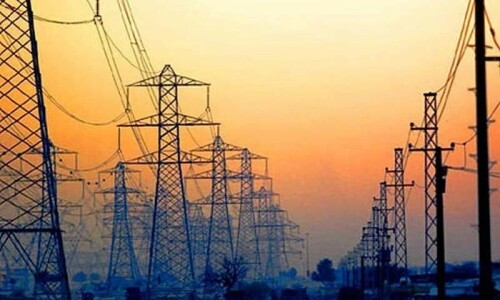• Awais Leghari says consumers paying Rs8 per unit tax amid authority’s failure
• Orders detailed audit of IPP agreements spanning over past three decades
ISLAMABAD: Facing criticism over unaffordable electricity, governance and operational and decision-making issues in the power sector, Power Minister Awais Ahmad Khan Leghari on Friday attempted to shift some of the blame onto the rest of the government machinery.
In a testimony before the Senate Standing Committee on Power, Mr Leghari said the FBR’s tax machinery had failed to do its job and the entire burden had been shifted to the power sector, which had been turned into a tax collection agent.
He told the meeting, presided over by PTI Senator Mohsin Aziz, that consumers were paying about Rs8 per unit tax on electricity before the fresh tariff hike, while electricity demand had dropped by 8pc, mainly due to higher end-price, which included several taxes.
Mr Leghari said almost everything in the power sector was linked to the US dollar and the rupee’s devaluation increases payables, not only to power producers and equipment suppliers but also to financial institutions, etc.
He also conceded that the sector also faced challenges in delivering electricity to load centres because of transmission system issues, which has led to the use of expensive plants instead of cheaper energy.
Senator Aziz questioned the logic behind setting up an imported coal-based power plant at Sahiwal. Mr Leghari responded that the plant was set up when Thar coal was not available and the capacity payments were also on the lower side.
Senator Shibli Faraz criticised the power sector’s lack of planning, pointing out that the Sahiwal plant was not established in 1947 and that its capacity payments could not have been estimated. He insisted that power plants should be established based on sound economic and financial viability instead of someone’s wishes.
He said it was strange that imported coal was being transported to Sahiwal through special trains.
Secretary Power Rashid Mahmood Langrial said the imported coal-based power plants would be converted to local coal gradually, taking around four years. “This (conversion) will provide about Rs200bn in annual savings,” Mr Leghari said.
Audit of IPP contracts
Later, Power Minister Leghari ordered a detailed audit of independent power producers (IPP) agreements spanning the last three decades after a Senate panel raised concerns over the transparency and financial implications of these contracts.
This came two days after the power regulator Nepra also described the generation as the elephant in the room, causing unaffordable electricity prices and called for looking into some grey areas.
Senator Aziz characterised the IPP contracts as robbery and called for a detailed investigation into project-specific details such as heat rates and regional price comparisons for similar technologies.
Acknowledging the complexity of power purchase agreements, implementation agreements and sovereign guarantees, Mr Leghari directed officials from the Private Power and Infrastructure Board and the Central Power Purchasing Agency-Guarantee to conduct a review to ascertain any financial discrepancies arising from changes in these agreements over time.
Published in Dawn, July 13th, 2024














































Dear visitor, the comments section is undergoing an overhaul and will return soon.